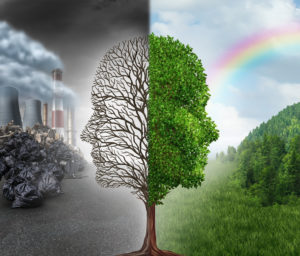 “Everybody talks about the weather, but nobody ever does anything about it.” ~ Mark Twain.
“Everybody talks about the weather, but nobody ever does anything about it.” ~ Mark Twain.
I too have been guilty of this. I thought I was doing my bit by segregating waste, using more recycled products, buying more organic food, avoiding plastic, using energy saving devices and so forth. Clearly, I was lulled into a sense of complacency. However, triggered by the onslaught of adverse news, from Delhi pollution and the Venice flooding to forest fires in California and Australia, I decided to calculate my own annual carbon footprint.
It is roughly 11 tons. Just to put it in perspective, an average American’s annual carbon footprint is 16T, an average Indian is 1.8T and the global average is around 4.5T. If the world follows through on the Paris climate change accord, the global average would need to be below 2T by 2050. I guess that’s what my goal should be – progressively reducing my carbon footprint from 11T to 2T.
Looking through the data, what was apparent was that the biggest contributors of CO2 emissions for me are: a) use of my car, b) consumption of food and other household products, c) international travel, and d) use of electricity. Incidentally, I work from home and use my car only 3-4 times a week, I am not an extravagant spender and my international travel is limited to a couple of holidays and a few short work-related trips every year. If you are a business leader, I wonder what your carbon footprint might be?
As I analyse my options for the way forward, it is becoming quite evident that there aren’t many easy answers and that we would need more substantive shifts. I thought of sharing with you some of the views I have explored in case they are helpful in some way.
Calculate your carbon footprint
What gets measured gets done. If we don’t have a clear measure of our carbon footprint and its sources, we may remain ignorant of the personal efforts we need to make to fight climate change. While the governments and the industry surely need to do much more, we can take greater self-responsibility too. For quick and easy carbon footprint calculators, you can try Calculate Footprint, What’s my footprint, or Carbonify.
Reduce consumption
Humanity’s burden on the planet now exceeds its carrying capacity. We are using natural resources 1.7 times faster than earth’s ecosystems can regenerate. The only way to reverse this alarming trend is to reduce our consumption levels. This has to begin with the wealthy. The wealthiest 10% of the world contribute to half of the global emissions, with the average carbon footprint of the super-rich (with an investible surplus of over US$ 1 million, besides their home) estimated to be a staggering 65T.
The challenge is the rich are used to a certain lifestyle that they don’t wish to change. How many are willing to reduce their number of international holidays, buy fewer clothes, or move to a moderate-size home? The rich not only consume more, they waste more too. They throw away over 3kgs of stuff every day. As the rich moderate their consumption, the less affluent may also be less tempted to seek hedonistic consumption.
Move to renewable energy wherever possible
Use of coal-based electricity, airline fuel during plane travel, and petrol/diesel for the car account for a large portion of our personal carbon footprint. Any changes we can make in this usage can be significant. Simply flying less and primarily using public transport is ideal. I figured moving to an electric vehicle, powered by solar energy, can reduce my footprint by nearly 25% (I am actively considering this). Similarly, moving to solar-powered electricity for my home (I just did) can help reduce my footprint by another 15%. Choosing airlines that progressively use bio-fuel instead of standard jet fuel can be greatly helpful.
Alter food habits
We all know meat consumption is a huge contributor to carbon emissions. The global livestock industry produces more greenhouse gas emissions than all cars, planes and ships combined. Unfortunately, with growing prosperity among developing nations, worldwide meat consumption is on the rise. Actively reducing meat consumption is essential to mitigate climate change. It’s also a healthier option.
Further, we can choose to buy more food products that are organic (better for the soil and bio-diversity) and locally produced (reduces transport emissions). Also, we can consider recycling our food waste. If food waste were a country it’d be the third-largest emitter of greenhouse gases, behind China and the U.S. For example, an average Singapore home throws away about 2.5kg of food waste each week. I am proposing an eco-digester for our building. Else, we can consider starting a compost at home.
Plant more trees
Lastly, we can plant more trees to offset our carbon footprint. My wife and I have been gifting trees to our friends on their happy occasions. Also, we have just planted hundreds of trees to offset our family’s annual carbon footprint. While planting trees in not the long-term solution – reducing consumption and minimising our carbon footprint are – it certainly helps in the short-term. If you are looking to plant trees, you can consider Grow Trees.
I would love to hear your thoughts and experiences around fighting climate change at a personal level.











 The Olympics, Transcending Ourselves, and Personal Mastery
The Olympics, Transcending Ourselves, and Personal Mastery Obsessed With Self-Improvement? Try Self-Acceptance
Obsessed With Self-Improvement? Try Self-Acceptance Discover Your IKIGAI, Create A Life
Discover Your IKIGAI, Create A Life Thriving In An Alternate Second Career
Thriving In An Alternate Second Career If You Can’t Do What You Love, Try Loving What You Do
If You Can’t Do What You Love, Try Loving What You Do
Our knowledge about reducing footprints is so meagre that by reading the article,i am sure many like me will be benefitted
Although the efforts by using alternative sources of energy,disposal of waste, reducing/ reusing/ recycling, minimising plastic waste,every one can put his bit
The environment pollution, the stubble burning,ever increasing number of people are going to be pain in the neck for vast country like ours
Increasing general awareness above carbon print,be more concerned about the environment and efforts by all of us will make the difference
Person like you can do a lot by hammering this issue time and again will surely going to change the equation
I on my part will certainly do my best in this direction
Dear Rajiv
Very pertinent points. And I just cant help reflect back on the simple average lifestyle that we used to have back in India & that is reflected in the numbers you throw up that an average Indian’s carbon foot print is only 1.8T, way below compared those of the high (& unnecessary, in most cases) consumption driven countries.
If you look back at the Hindu culture, it was very much based on the very points you make in your article. Be it about No or less consumption of meat, about renunciation of all worldly comforts, about planting trees, etc (in Vanaprastha & Sanyasa Ashrama).
Its important for us to analyse how we can use our ancient wisdom in today’s modern world and strive to make it a better, more sustainable place for generations to come.
Great points Surendra, love the connection with ancient wisdom, thanks for sharing!
One clarification Surendra, the current low average of carbon footprint in India also has a lot to do with India’s large population and relatively lower per capita income. The average footprint of the affluent in India’s metros would be much higher…
Hi,
Do you think it would also require major rethinking on what we cherish and consider as our achievements, current goals, career paths, science, technology and developmental paradigms as individuals, govts, society ?
Is it possible to share the calculations and the source of data about renewable energy and electric vehicles as there is enormous amount of embodied energy and environmental costs related to them ?
Thanks
Hi Sanjeev,
Thanks for mentioning. Yes, I think as a society we have to actively differentiate between ‘wants’ and ‘needs’. We WANT bigger cars, bigger houses, latest gadgets, but do NEED them. Of course, this shift requires greater self-realisation and cultivating deeper sense of peace and contentment within.
As regards the electric vehicles, I realise that they have two sources of carbon footprint – a) emissions related to the manufacturing of the car and b) emissions liked to the source of electricity (coal etc.). I have considered the former as part the footprint linked to my overall consumption of goods (no different from a petrol vehicle). As regards the second, I have taken a renewal source of electricity (Singapore has recently made solar energy available for households and residential buildings) and thereby assumed emissions from running the car to be zero (compared to nearly 3T from my petrol car). Not owning a car altogether would reduce part (a) of the footprint and reduce my overall footprint even further. Hope this clarifies.
Thank again for writing in!